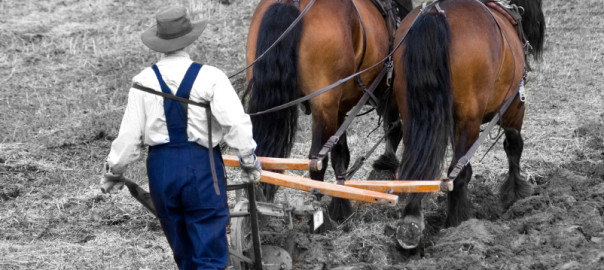The setting of the 1965 film Shenandoah 1 is a family farm in Virginia’s Shenandoah Valley during the American Civil War. It is a story about a family’s struggle to maintain their isolation from a war that rages all around their property.
Within this family are eight children, all of whom are young adults: six sons, one daughter, and one daughter-in-law. And at the head of this clan is a strong, hardened, and fiercely independent father, Mr. Charlie Anderson (played by actor Jimmy Stewart).
In one scene the nine Andersons are seated around the dinner table … but there are ten places set. And where the tenth plate is set, there stands an empty chair. It soon becomes apparent that the mother of the family had died 16 years earlier while giving birth to the youngest of the sons. Martha Anderson had been a religious woman. And right before she died, she made her husband promise to give their children a Christian upbringing. Although Charlie Anderson believed that acknowledging God was nothing but a waste of time, he agreed to do so as a way to honor the wife he still deeply loved and greatly missed.
There were two things he did to give his children proper religious training: he made sure they went to church every Sunday, and he offered a prayer before every meal. But let’s listen in on one of his prayers:
“Lord, we cleared this land. We plowed it, sowed it, and harvested it. We cooked the harvest. It wouldn’t be here and we wouldn’t be eatin’ it if we hadn’t done it all ourselves. We worked dog-boned hard for every crumb and morsel. But we thank You just the same anyway Lord for this food we’re about to eat. Amen.”
Charlie Anderson made no bones about it. He saw no point in thanking God (sincerely) for the food on their table when it seemed to him that he, his sons, and his daughters had done all the work. This father was convinced that his family did not need anyone to help them with their farm. He did not need slaves. (He was not a Confederate.) He did not need the federal government. (He was not a Unionist.) And he most certainly did not need God. (He was not wise.) Charlie Anderson believed his family to be entirely self-sufficient.
But we should take note that he left out a few things in his prayer. He makes no mention of the existence of seed … or the fertility of the soil … or the regularity of spring and autumn rainfall … or the sun’s light … or its warmth … or, for that matter, his and his wife’s ability to produce sons to work the land.
What Charlie Anderson was not … nor ever could be … is what God is. God is the only One Who is truly self-sufficient. And because He is self-sufficient, He is the only One Who can be our all-sufficient Help. He provides us with everything we need … in every aspect of life … that we might live abundantly … in a way that pleases and honors Him.
Almighty God is our All … in all.
Do you believe that? Do you believe that the God of the Bible can provide you with everything you need? More than likely, those of us who are reborn followers of Christ would say “Yes, I believe that.” And yet, how we live may contradict what we say. So, let’s rephrase the question.
When we face a hard situation, what is the first thing we do about it? Do we run to the God of peace? Or do we retreat to some pain killer such as excessive work or excessive food or a chemical that dulls the sting? Do we flee to God for strength … or do we escape to a sports bar or to a shopping mall to deaden the pain? We, the true and living Church, claim to believe that God is our “All, in all” … at least while sitting in the pew. But do we live out that belief at the workplace and at school and at home?
The all-sufficient One is going to spend a lot of time convincing us that we are completely dependent upon Him … in every area of life. To do so, He will sometimes apply polish to our lives with a piece of velvet. At other times He will apply fine sandpaper. And sometimes He may even use a jackhammer. But whatever the circumstance – favorable or painful – we are going to find ourselves in the position of learning two priceless truths: that “apart from Christ Jesus, we can do nothing” … but with Christ Jesus “all things are possible.”
The all-sufficiency of God is a trait found embedded in His Hebrew Name, El Shaddai. It is a Name that declares God to be our Everything … in everything. He is our “All … in all.”
Click here to view this course: THE GOD OF OUR LIVES
Click here to view our website: STEWARD OF TRUTH PUBLICATIONS
Click here to read the 1ST chapter of The God of Our Lives: YAHWEH, OUR GOD IS OUR CREATOR
To the readers within the believing community: My wife and I would greatly appreciate your prayers, that we would respond to adversity with grace and righteousness.
1 Shenandoah, directed by Andrew V. McLaglen; produced by Robert Arthur; written by James Lee Barrett; music by Frank Skinner; Cinematography by William H. Clothier, edited by Otho Lovering, distributed by Universal; starring James Stewart, Doug McClure, Glenn Corbett, Patrick Wayne, Katharine Ross, and Rosemary Forsyth; release date June 3, 1965.



Thank you for the insightful thoughts into our amazing Lord! He is our all-sufficient One.